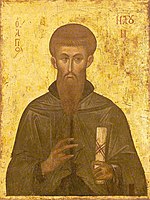Naum of Ohrid
| Saint Naum | |
|---|---|

Icon of Saint Naum
|
|
| Wonderworker, Apostle of the Slavs | |
| Born | ca. 830 |
| Died | December 23, 910 Ohrid, Bulgarian Empire, (present-day Republic of Macedonia) |
| Venerated in | Eastern Orthodox Church, Eastern Catholic Churches, Latin Church |
| Major shrine | Monastery of Saint Naum in Ohrid (Sveti Naum) |
| Feast | 5 January and 3 July (Julian calendar), 20 May and 23 December (Revised Julian calendar, Gregorian calendar) |
| Patronage | People with mental disorders and/or other illnesses [2] |
Saint Naum (Bulgarian and Macedonian: Свети Наум, Sveti Naum), also known as Naum of Ohrid or Naum of Preslav (c. 830 – December 23, 910) was a medieval Bulgarian writer, enlightener, one of the seven Apostles of the First Bulgarian Empire and missionary among the Slavs. He was among the disciples of Saints Cyril and Methodius and is associated with the creation of the Glagolitic and Cyrillic scripts. Naum was among the founders of the Pliska Literary School and is venerated as a saint in the Orthodox Church.
Information about his early life is scarce. According to the hagiography of Clement of Ohrid by Theophylact of Ohrid and some other sources, Naum took part in the historic mission to Great Moravia together with Saints Cyril and Methodius, Clement, Angelarius, Gorazd and other Slavic missionaries in 863.
For the next 22 years, he worked with Cyril and Methodius and other missionaries in translating the Bible into Old Church Slavonic and promoted it in Great Moravia and Principality of Lower Pannonia. In 867 or 868 he became a priest in Rome. For the purpose of the mission to Moravia, the missionaries devised the Glagolitic alphabet, the first alphabet to match the specific features of the Slavic language. Its descendant script, Cyrillic, is still used by many languages today. The missionaries also wrote the first Slavic Civil Code, which was used in Great Moravia. However, the missionary work ran into opposition from German clerics who opposed their efforts to create a Slavic liturgy. By 885, the two main patrons for the missionaries, Rastislav of Moravia of Great Moravia and Prince Koceľ of Pannonia, as well as Cyril and Methodius had died, and the pressure from the German church became increasingly more hostile. After a brief period of imprisonment due to the ongoing conflict with the German clerics, Naum, together with some of the missionaries headed to Bulgaria.
...
Wikipedia
